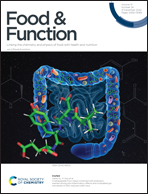Mechanism investigation of fermented egg-milk peptides on colonic inflammatory diseases: based on in vivo and in silico research†
Abstract
Fermented egg-milk peptides (FEMPs) could alleviate the symptoms of inflammatory diseases but the underlying regulating mechanism of effective ingredients is unclear now. Our research was designed to confirm the protective function of FEMP, then analyze the potential targets and pathways that could be regulated by digested FEMP (dFEMP). The results showed that FEMP could ease the inflammatory symptoms in the colon, repair the damage of inflammation, and decrease the level of pro-inflammatory cytokines (decreased by 31.81% TNF-α, 60.20% IL-1β, 85.65% IL-6). The results of in silico experiments revealed that dFEMP could influence many inflammation-related targets. Most targets affected the inflammation-related function and participated in the inflammatory signaling pathways, such as the T cell receptor (TCR) signaling pathway. Besides, molecular docking results revealed that hydrogen-bonding and salt bridges played vital roles in the dFEMP-target interactions. Combining in vivo experiments with in silico experiments, this study can prove a new theory for research between the bioactive peptides and inflammation.



 Please wait while we load your content...
Please wait while we load your content...